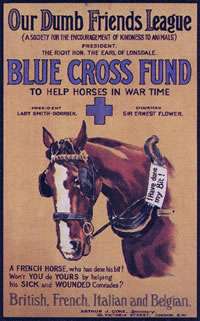Blue Cross (animal charity)
 | |
| Founded | 1897 |
|---|---|
| Focus | Animal veterinary treatment, rehoming and owner support |
| Location |
|
Area served | United Kingdom |
Revenue | £26.9 million[1] |
Employees | 550[2] |
Volunteers | 4,000[1] |
| Slogan | Britain's Pet Charity |
| Website | http://www.bluecross.org.uk |
Blue Cross is a registered animal welfare charity[3] in the United Kingdom, founded in 1897 as Our Dumb Friends League.[4] The charity provides support for pet owners who cannot afford private veterinary treatment, helps to find homes for unwanted animals, and educates the public in the responsibilities of animal ownership.
The charity works closely with a number of other organizations to promote animal welfare and responsible pet ownership.
History

The organisation was founded on 10 May 1897 in London as Our Dumb Friends League, to care for working horses on the streets of the British capital.[5] It opened its first animal hospital, in Victoria, London, on 15 May 1906.
In 1912, the league launched The Blue Cross Fund to care for horses during the Balkan War. On the outbreak of the First World War in 1914, it was quickly reopened again. By the armistice in 1918, the Blue Cross Fund had raised nearly £170,000 – the equivalent of almost £6.5 million today – to care for the animals of conflict. Over 50,000 horses were treated in Blue Cross hospitals in France, and the charity had sent vital veterinary supplies to 3,500 units of the British Army.[6]
Donations to the Fund enabled the charity to care for more than 350,000 animals during the Second World War, many of who were wounded during the Blitz.[7] The name of the appeal fund became more widely known than the official charity title and the league officially changed its name to "The Blue Cross" in 1950. In 2011 the charity dropped "The" from its name and is now simply known as "Blue Cross."
Sally de la Bedoyere became the charity’s CEO in November 2014.[8]
Operations
Blue Cross operates a number of services throughout the United Kingdom. Its major services are: rehoming unwanted animals, providing veterinary services to pet owners who cannot afford the private fees charged by private veterinary surgeons, promoting animal welfare through education, and operating the Pet Bereavement Support Service, a free and confidential support line for those who have lost a pet. They also operate a horse ambulance service, including at large equestrian events.
Blue Cross operates four animal hospitals, three of which are in London, at Victoria, Merton and Hammersmith, and a fourth in Grimsby, Lincolnshire,[9] as well as running mobile clinics throughout the country. In 2014 it opened a pet care clinic in Derby.[10] Blue Cross carried out over 97,000 treatments, operations and diagnostic investigations in 2010.[1]
Blue Cross is also heavily involved in animal adoption, arranging adoption for companion animals such as cats, dogs, rabbits and small rodents, as well as larger species such as horses.[11] In 2013, the charity rehomed 8,191 animals.[12]
The organisation also works to improve the lives of animals through promotion to pet owners and work in animal behaviour therapy. Every pet owner that rehomes a pet through the charity can benefit from free behaviour advice for the pet’s lifetime. The Pet Bereavement Support Service is available 365 days a year to help people who are struggling to cope with the loss of a pet.
Proposed closure of two animal centres
On 26 January 2010, Blue Cross announced the proposed closure of the two animal adoption centres (Felixstowe and Northiam, East Sussex), both of which had been in existence for over 50 years. Final decisions on both sites were announced on 4 May 2010. After an extensive publicity campaign by locals, it was announced that plans to close the Felixstowe centre had been dropped.[13] The centre will relocate to a brand new site near Ipswich. Work on the purpose-built rehoming centre is due to begin in 2014.[14]
Partnerships
The Irish Blue Cross is a related party of Blue Cross.
Awards
Medals have been awarded by Blue Cross to animals and people who have demonstrated bravery or heroism. While the first medals were awarded to people who helped to rescue animals, medals were awarded in 1918 to honour a number of horses which had served in the First World War. Medals were then given out between 1940 and 1951 to a number of dogs, including Juliana who reportedly extinguished an incendiary bomb by urinating on it. In 2006 Jake, a police explosives dog, was given the honour after helping to clear out the London Underground after the 7 July 2005 London bombings.[15]
References
- 1 2 3 "Annual Review 2010". The Blue Cross.
- ↑ "The Boss: Kim Hamilton". Channel 4: Undercover Boss. 2011-07-12.
- ↑ Charity Commission. Blue Cross (animal charity), registered charity no. 224392.
- ↑ "History of the Blue Cross". The Blue Cross.
- ↑ "About Blue Cross". Blue Cross. Retrieved 2 February 2016.
- ↑ "Our history of helping horses". Blue Cross. Retrieved 2 February 2016.
- ↑ "News". Blue Cross. Retrieved 2 February 2016.
- ↑ "The Big Hire: Sally de la Bedoyere of Blue Cross". Retrieved 2 February 2016.
- ↑ "What we do". The Blue Cross.
- ↑ "For fleas, a jolly good fellow!". Derby Telegraph. Retrieved 2 February 2016.
- ↑ "Adopt an animal". The Blue Cross.
- ↑ "Publications". Blue Cross. Retrieved 2 February 2016.
- ↑ Richard Cornwell. "Blue Cross animal rescue centre saved!". Ipswich Star. Retrieved 2 February 2016.
- ↑ "Felixstowe/Wherstead: Approval given for new Blue Cross rescue centre". Ipswich Star. Retrieved 2 February 2016.
- ↑ Sam Marsden (4 September 2013). "Dog cocked leg to extinguish Nazi bomb". The Telegraph. Retrieved 7 September 2013.